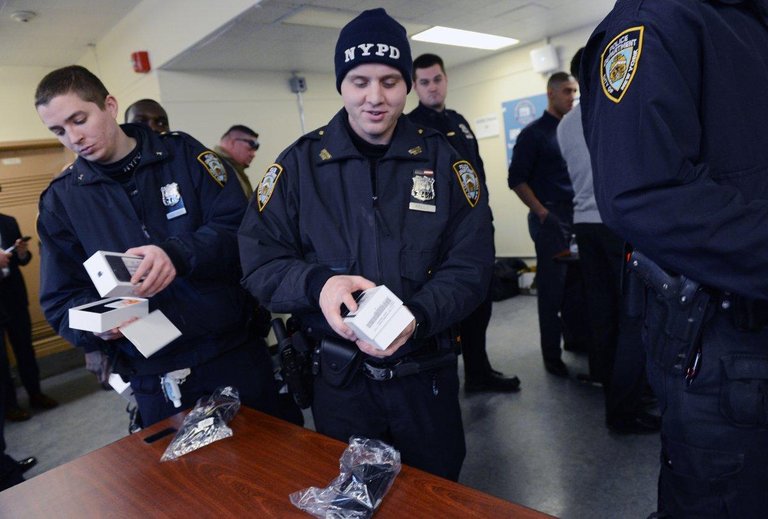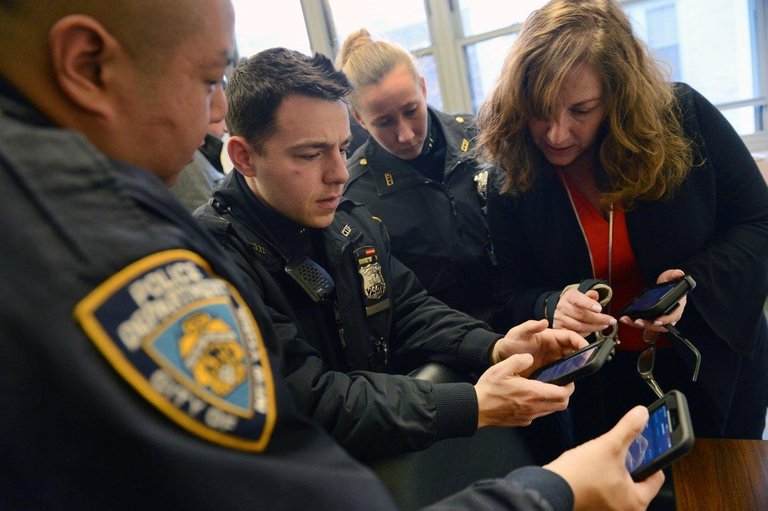NYPD Arms Cops with iPhones Capable of Biometric Scanning
Danny Panzella
PeacefulStreetsNYC.com
2/5/19
This week the NYPD is outfitting Manhattan South officers with iPhone 7 and 7 Plus phones.Bronx and Staten Island officers already received the iPhone 7 or 7 Plus, Brooklyn and Queens are next to be equipped.

Within the next week, cops covering Wall Street to 59th Street in Manhattan will be “i-ready to protect and serve,” according to NYPD Deputy Commissioner for Information and Technology Jessica Tisch.
“We’ve been giving out about 600 phones a day,” Tisch said during a recent visit to the rollout center at the old academy on E. 21st St.
I reported back in 2010 that the NYPD was testing iPhones with biometric scanning capabilities such as iris scanning. It was first implemented in the court system to avoid prisoners escaping by impersonating other inmates.
*The NYPD has begun to implement iris scanners to create a bio-metric database of criminal suspects as they are processed through central booking. NYPD says this new identification program is a fail-safe measure to prevent escapes as suspects move through the court system and that this technology is in response to two suspects escaping police custody by impersonating lesser offenders.
At a Border Patrol station in McAllen, Texas the Department of Homeland Security beta tested iris scanners and in one Missouri county, the sheriff’s office is using an Iris scanner purchased with U.S. Department of Justice funds. Unknown by most, the technology is reportedly already being used by law enforcement in 40 states throughout the country.
Violating Civil Rights, Theres an App for that. Watch the video demonstration above.
B12 Technologies has equipped police with iPhones armed with facial recognition software linked to fusion center databases.
The NYPD program is being paid for by a grant from the Department of Homeland Security. The NYPD already shares its database information with DHS through its NYPD Intelligence Division, which is actually a known “fusion center.” These fusion centers act as hubs of information, merging databases from the NYPD, DHS, Motor Vehicle and many other sources to create a searchable catalog of the entire population. There are over 70 fusion centers in the United States according to Catherine Bleish founder of Operation Defuse. *
With what we now know about unfettered NSA surveillance of US Citizens, Telecom and Social media cooperation with the agency there isn’t much information that isn’t available to these fusion centers.
*“A speaker at the 2010 National DHS fusion center conference indicated integration of iris scanning with red-light cameras, speed cameras and other automated revenue generating devices was in the near future. The FBI Next Generation Identification database expands their old fingerprint only database to palm, iris, facial, and scar/tattoo biometric data. We have begun to rapidly decline down a slippery slope. The war on terror has become a war on our freedom.” Said Bleish of the new “security technologies.”
“That’s not our intention here, but it has potential,” Police Commissioner Ray Kelly said in reference to using the iris scanners for counter terrorism purposes.
“The NYPD can now photograph the irises of suspects arrested for any reason and they implemented this without any legislative oversight or public discourse. There are also no reports on how authorities plan to protect this collected biometric data from misuse.” said David Perecman a civil liberties attorney in New York.
That is probably because the NYPD Intelligence division has no plans to protect this information from being disseminated through the NY fusion centers allowing access to any law enforcement agency in the network.
“This type of data collecting is not authorized by any New York statute. Collecting fingerprints is specifically allowed. DNA evidence has had more legislative debate and its usage is only limited to certain types of cases.” said Perecman.
This information dovetails with another recent controversy over “stop and frisk” databases. Ray Kelly and Mayor Bloomberg pushed to keep the recently banned NYPD policy to keep a database of New Yorkers who were stopped and frisked but not found guilty of any violation. You read that correctly. Mayor Bloomberg wanted to keep a list of innocent people who the NYPD stopped and frisked with no probable cause in a direct violation of their Constitutional rights. Incidentally only 6 percent of those random stop and frisks lead to an arrest, the conviction rates were not readily available. That means that more than 94% of people in that database are innocent.
The “250” List as it is referred to because of the UF-250 form that officers use to file stop-and-frisk reports has over 3 million names on it. Eighty seven percent of those stopped were black or Latino.
Governor Paterson signed into law a ban on this policy, although that only stops the NYPD from keeping their names in an electronic database. The NYPD is still keeping a paper record of these stops even if no evidence of a crime has been found and no arrest made. The NYPD continues to violate the constitutional rights of New Yorkers randomly stopping people for reasons as innocuous as spitting on the ground or dropping a cigarette butt. It should also be noted that the Mayor Bloomberg has been lobbying for British style video surveillance in NYC. Britain has one CCTV camera for every 14 citizens.
So where do we see all of this going? If Mayor Bloomberg and Commissioner Ray Kelley get their way Police officers will be stopping, frisking and taking retinal scans of millions of innocent New Yorkers then data sharing with the Federal government, Homeland Security and other law enforcement agencies in violation of the U.S. Constitution and Bill of Rights.*
Some of the apps the NYPD will use include:
911: As soon as a 911 dispatch comes into the system, it would instantly reach the iPhones of the every police official within the precinct. The notification would come with a description of the call along with a hyperlink to the caller’s phone, incase police officials need to call them back.
SEARCH: This app lets officials run checks on license plates or names and also checks whether a person has a warrant or not, or if a car was reported to be stolen.
MESSAGING – Every smart phone has a text app these days, but not like this. The NYPD app works off the department’s organizational chart, which allows them to send messages to cops in a specific geographic location, a cluster of precincts, or to every cop in the city, whether they are on duty or not. The messaging app has proven very helpful if cops are looking for someone, such as a missing child or a bank robber.
FORMS – Cops can use this app to pull up accident reports, domestic violence reports, aided cards and certain summonses that they can fill out right on their phone.
ECMS – The case management app is designed for NYPD detectives who, historically, would have to end their tours updating their cases with the interviews and evidence they collected throughout the day. With this app, detectives can input the information right on the phone the moment an interview is done. The info is then downloaded right into their case file for later reference.
SECURITY CENTER – Supervisors responding to an emergency can use this app to access all the CCTV cameras in an area in their search for a suspect. This past New Year’s Eve, supervisors on the ground at Times Square were able to access video feeds from circling helicopters to get a bird’s-eye view of the event.
RESOURCES – Big Brother is watching, officers! With this app, a supervisor can get a high-level view of all NYPD cops and equipment in any given area — where each squad car is, which officers are in those cars, what type of job the officers are on and how long they have been at a specific location. They will even know if a specific vehicle is on, moving and how fast it is going.
The iPhones are also being used to fill out some summonses, accident reports and domestic violence reports.
When cops are responding to a job, the phone will automatically provide them with the criminal history of the location, such as how many 911 calls have been at the address in the past and what type of calls. The phone also tells the officers if any wanted felons are at the address. All of the information is prioritized based on the emergency the officers are responding to. If cops are heading to a location regarding an emotionally disturbed person, all similar data will show up on the information feed first, officials said.
It is still a mystery whether or not the phones include the Mobile Offender Recognition and Information System, or MORIS, is made by BI2 Technologies in Plymouth, Massachusetts.
When attached to an iPhone, MORIS can photograph a person’s face and run the image through software that hunts for a match in a BI2-managed database of U.S. criminal records. Each unit costs about $3,000.
As I reported in 2011 MORIS uses Animetrics facial recognition softwarecommissioned by the Department of Defense.
*Animetrics and B12’s relationship with the DOD is no surprise; as of March 2010 there is now a U.S. Government national security agency called BIMA. “The Biometrics Identity Management Agency leads Department of Defense activities to prioritize, integrate, and synchronize biometrics technologies and capabilities and to manage the Department of Defense’s authoritative biometrics database to support the National Security Strategy,” according to a March 23 Order (pdf) issued by Army Secretary John M. McHugh.
“Every day thousands of [biometric] records are collected and sent to the Department of Defense (DOD) Automated Biometric Identification System (ABIS) to store and compare against existing records,” a 2009 DoD report(pdf) said.
This confirms TruthSquads suspicions that the NYPD would be sharing biometric data collected with the Pentagon.
The NYPD is already using facial recognition software to scan its surveillance cameras that are posted all over the city as reported by the NY Daily News.New York City is estimated to have as many as 40,000 public and private surveillance cameras watching over its streets, outnumbered only by London and the Chinese city of Shenzen.
The NYPD “Argus” wireless camera system is estimated to have 4000 (as of 2010) cameras across the city. The Argus name comes from Greek mythology, referring to a giant with a hundred eyes.*
The NYPD has not yet made any public statements or responded to requests for information about whether these new iPhones are equipped with Iris scanning technology. We can safely say that if these phones aren’t already equipped with this technology it wont be long before they are.

Great post Danny. Upvoted. It amazes me how far our privacy is being eroded and how few people are worried about it.
Danny, wow, I am so glad my work from 2010 is still relevant. Thank you for sounding the alarm!!